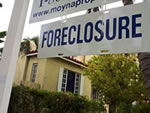Mortgage News
Mortgages
Driving can be hazardous to your homeownership
by Broderick Perkins
(02-21-2010) Homeowners who live in areas that force them to drive everywhere, not only face a home value hit, they are also at greater risk of foreclosure, according to a new report from the Natural Resources Defense Council (NRDC).
"Location Efficiency and Mortgage Default" used data culled from 40,000 Chicago, San Francisco and Jacksonville, FL mortgages which showed that the probability of mortgage foreclosure decreased in neighborhoods with characteristics that enable less reliance on cars, after accounting for important factors like income.
"In all three cities, the results were the same -- if your only choice is to drive, you have much less economic flexibility -- flexibility that can protect you from foreclosure in tough times," said Jennifer Henry, real estate sector manager in the Center for Market Innovation at NRDC.
The report is also an eye-opener for policy makers. It reveals how the connection between driving and foreclosure risk could provide policy makers and the lending industry with new tools to address the continuing mortgage default problem.
"Add urban sprawl to the list of sources for our current financial mess," said David Goldstein, co-director of the Energy Program at NRDC.
"It's not just predatory lending or lax standards. The connection between transportation costs and mortgage default cannot be ignored. The sooner we address it in our lending and development practices, the sooner we will start to see a more stable real estate sector," he added.
Driven to foreclosure
The greater prospect of foreclosures in areas with a lot of drive time is largely due to the financial cost of driving. Transportation costs account for roughly 17 percent of the average American household's income and these costs are exacerbated by fluctuating gas prices.
Even before gas prices surpassed the $3- to $4- a gallon mark National Housing Conferences' Center for Housing Policy found in "A Heavy Load: The Combined Housing and Transportation Burdens of Working Families" that in 17 of the 28 metropolitan areas studied, the average transportation expenses for working families with annual incomes from $20,000 to $50,000 were actually higher than their housing costs.
The NRDC report focuses on the impact of "location efficiency" on mortgage performance, a concept pioneered by NRDC and other groups in the 1990's. It shows that rates of vehicle ownership -- largely determined by neighborhood compactness, walkability, and access to public transit -- is key to predicting mortgage performance and should be taken into account by mortgage underwriters, policymakers, and real estate developers.
"Knowing that now, aggressive investment in public transportation and walkable communities make even more sense. And investing in transit will not just improve our economy by avoiding future foreclosures -- but create jobs to get things humming right now," said Henry.
Location Efficient Mortgages (LEMs)
NRDC says the study points to the need for:
• Public policies that encourage location efficient land use; infrastructure and transportation that support location efficient communities to help reduce foreclosures. This includes a "Fix-It-First" focus on existing transportation systems.
• More research and analysis to develop and refine tools to assess the impact of location efficiency.
• Mortgage underwriting practices that provide access to proportionally better qualifying terms for purchasers of location efficient homes.
Those underwriting practices do exist, to a small degree.
Much as "Energy Efficient Mortgages (EEMs)" allow a home owner with a more energy efficient home to spend more money on housing instead of energy, "Location Efficient Mortgages (LEMs)" allow home owners to spend a greater percentage of their income on housing when they spend less on petrol power transportation.
LEMs are offered by the Institute for Location Efficiency, but only in Seattle, San Francisco, Los Angeles and Chicago.
Refinance at Today's Low Rates!Follow the link to continue reading the related articles.
Hanley Wood announces hottest housing markets for 2010
Why consumers still balk at buying homes
Government Ramping Up New Short Sale Program
More Mortgage Help on the Way?
Foreclosure Rate Continues to Climb
Fannie Mae & Jumbo Mortgage Rates
Just One Click! = Current Rate Chart


